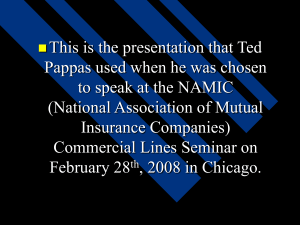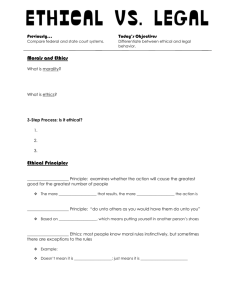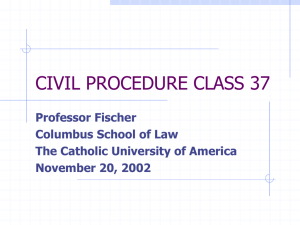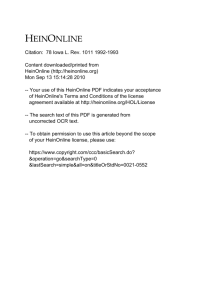Ethics_Seminar_Presentations
advertisement
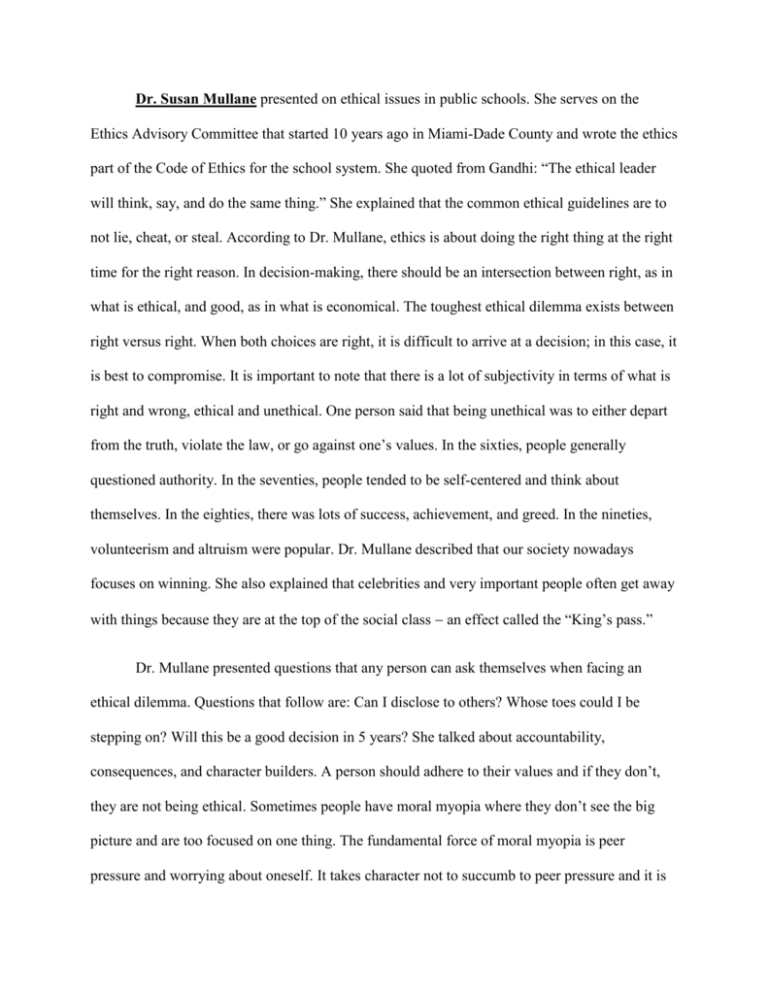
Dr. Susan Mullane presented on ethical issues in public schools. She serves on the Ethics Advisory Committee that started 10 years ago in Miami-Dade County and wrote the ethics part of the Code of Ethics for the school system. She quoted from Gandhi: “The ethical leader will think, say, and do the same thing.” She explained that the common ethical guidelines are to not lie, cheat, or steal. According to Dr. Mullane, ethics is about doing the right thing at the right time for the right reason. In decision-making, there should be an intersection between right, as in what is ethical, and good, as in what is economical. The toughest ethical dilemma exists between right versus right. When both choices are right, it is difficult to arrive at a decision; in this case, it is best to compromise. It is important to note that there is a lot of subjectivity in terms of what is right and wrong, ethical and unethical. One person said that being unethical was to either depart from the truth, violate the law, or go against one’s values. In the sixties, people generally questioned authority. In the seventies, people tended to be self-centered and think about themselves. In the eighties, there was lots of success, achievement, and greed. In the nineties, volunteerism and altruism were popular. Dr. Mullane described that our society nowadays focuses on winning. She also explained that celebrities and very important people often get away with things because they are at the top of the social class an effect called the “King’s pass.” Dr. Mullane presented questions that any person can ask themselves when facing an ethical dilemma. Questions that follow are: Can I disclose to others? Whose toes could I be stepping on? Will this be a good decision in 5 years? She talked about accountability, consequences, and character builders. A person should adhere to their values and if they don’t, they are not being ethical. Sometimes people have moral myopia where they don’t see the big picture and are too focused on one thing. The fundamental force of moral myopia is peer pressure and worrying about oneself. It takes character not to succumb to peer pressure and it is good to seek balance in one’s life. What I gathered from Dr. Mullane’s presentation is that to avoid ethical dilemmas, one must assess whole situations, ask themselves the above questions, understand the definitions of what is ethical and what is not, and adhere to one’s values. It is not healthy to be a turtle and avoid conflicts. Conflicts are good so that people can address and fix their problems after they are able to come to terms with other people. In Session 2, Dr. Mullane discussed conflict resolution. Her lecture was to help students and teachers make decisions and resolve conflicts. When examining possible cases of bullying, Dr. Mullane poses this question among several others regarding bullying: is there a power differential? Bullying was defined for us and we were provided with information about bullying on sheets of paper. There are different types of people. There are those who, when in conflict, accommodate (teddy bears), those who collaborate (owls), those who compromise (foxes), those who compete (sharks), and those who avoid (turtles). It is important to collaborate, look for things we can mutually agree on, and listen to each other. Many people in conflicts stick to their positions, but people should not be so concerned with positions. It is important to work on agreements, create options, and let the people having the conflict figure out solutions. It is good to create win-win situations and not to be stuck on winning. I agree with all of this as our society focuses very much on winning and not on resolving conflicts. There is a lot of competition in the world and not only do people aim to win and appear better than other people, but they also tend to victimize those less powerful and more vulnerable than they are – hence, bullying. If our society focused less on competition and winning, there would be fewer problems. People would be more willing to work together and be open to conflicts when they arise. They would work instead toward resolving problems. Professor Karen Throckmorton spoke about religion in the classroom. She presented us with an acronym to help us remember everything that the first amendment of the constitution entails. Grievances, Right to petition for a redress of Religion, Right to no establishment of Assembly, Right to peaceful Press, Freedom of the Exercise, Freedom of Religious Speech, Freedom of She discussed how teachers and schools should address religion. Teachers can not lead students in daily prayer. However, students can individually pray on their own time (lunch room, at the flag pole).She described different cases and instances where religion disrupted people’s rights. For example, there shouldn’t be a mention of G-d at graduation. There also shouldn’t be a religious blessing/prayer at a school game. Generally, religion should be separate from school. There are, though, thin lines and subjectivity. We all like to celebrate birthdays and most often do so in school, but Jehovah’s witnesses do not believe in celebrating birthdays. We all love to celebrate Halloween, and often schools have dress-up days and hold Halloween parties and dances, but technically the holiday has Catholic Christian influences. We would like to demonstrate diversity in the classroom by representing different religions, but Jehovah’s Witnesses do not believe in holidays or celebrations. Should there be an empty corner in the classroom? Atheists do not believe in religions worshipping gods. Therefore, would it offend them if teachers showcased different religions in the classroom? Dr. Throckmorton advised us to teach about religion but not to celebrate a religious holiday. Religion should be taught in school, but not celebrated or followed. “G-d” is still in the Pledge of Allegiance and being recited by numerous students and teachers every morning. If there should not be religion in school, then this rule should be consistent. Religion is in the Pledge of Allegiance. Should the word be taken out in schools or should students be told that they do not have to say it? Those who do not believe in G-d might be offended in reciting it. In order to promote diversity, I feel that no particular religion should be given more attention than others, and to avoid focusing on certain religions over others, schools should understand and recognize all religions. In order to prevent prejudice, discrimination, and favoritism, teachers should treat students with equity regardless of their religion. A teacher should not wish their students a happy holiday when the holiday is associated with a religion. They should not decorate the classroom with decorations associated with a religious holiday. Similarly, teachers should not allow representations of religion in the classroom but should respect students’ wishes to pray or worship their religion during an appropriate time outside of the classroom. Teachers should be aware of religious terminology and try not to use religious words in the classroom. If students reference religion in the classroom, teachers should redirect them by either modeling other words or steering them away from religion as social informal conversation. I say this because teachers should teach about religion in a formal academic learning environment but not discuss or share personal religious views and standpoints. All it takes is to exclude one religion and then we see people with feelings of inferiority. Ignorance and exclusion may translate to inequity, discrimination, and potential oppression on those targeted. It is important to be wary of the fact that what people do and say regarding religion, and in essence all aspects of life, affects other people and may socially harm them. People may not realize it, but neglecting to recognize and appreciate diversity stunts our growth and development as humans. People thrive on acceptance, and so accepting all religions, no matter what one’s personal views and preferences are, makes for a happier and more understanding environment.



